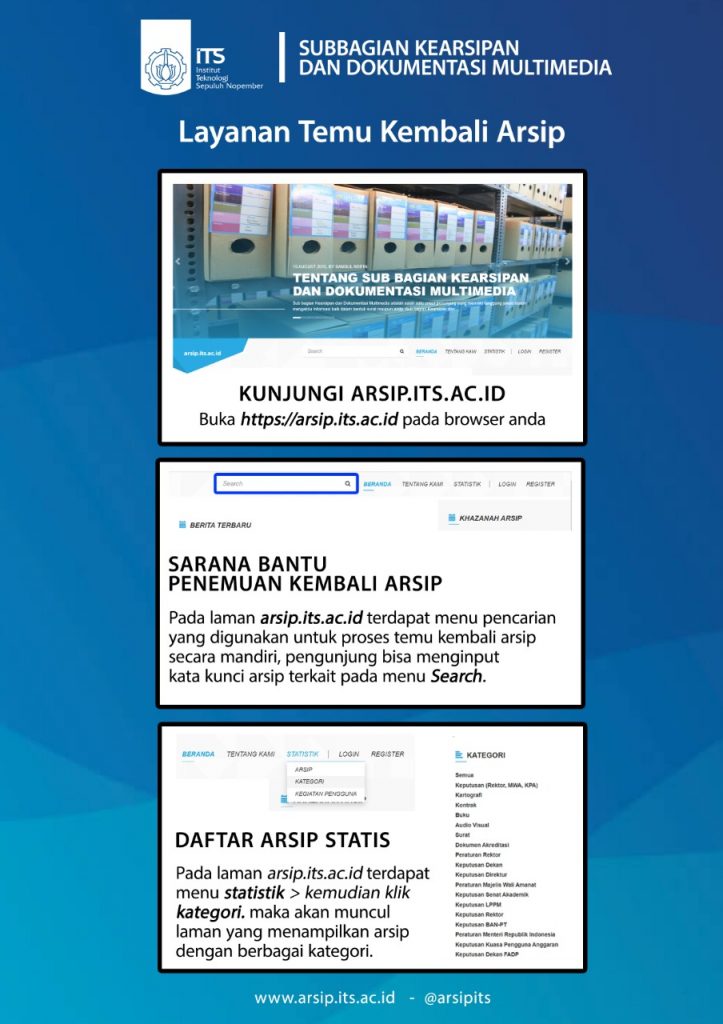BEWARE OF SUCCESSFUL DIGITAL ARCHIVES IN THE WFH ERA
BEWARE OF SUCCESSFUL DIGITAL ARCHIVES IN THE WFH
By: Agus Santoso, S.Sos.,M.Med.Kom
Head of Sub-Archive and Multimedia Documentation
Institute of Technology and November Ten
The Government’s policy to maintain distance and interaction in the current Covid-19 pandemic situation has created a new style of work known as Work From Home (WFH). WFH requires workers in both the Government and Private sectors to change their work style. Work that can usually be done face to face has now turned into a long distance system. The use of various information technology devices and long-distance communication applications has greatly increased. The WFH work style can be a common thing for those who are used to implementing remote working systems, but for those who are not used to this, it can be a scourge in itself. Various reasons were echoed by those who were not familiar with WFH, ranging from incompetence in the use of information technology media, to the classic but basic reason, namely “data is in the office”. This is the reason that makes the existence of digital archives to be successful in this WFH era. How not, so far digital archives are only a complement to work and even their existence does not always exist in an organization. Even so, digital archives are not conditioned according to optimal storage standards. When this digital archive has been managed properly, there is no longer any reason to carry out WFH properly.
In fact, our society always holds technological devices in the form of smartphones that allow it to support the implementation of this WFH. Ironically, there are still many of our people who prefer to use smartphones to store personal photos and videos, or even prefer to use them to play games and the Tik Tok application. This condition seems to be reversed when many government offices and private companies implement WFH, almost all workers keep digital archives which are their capital in working. Remote communication applications are also not left behind to be installed on smartphone devices. The description of this phenomenon has attracted the attention of archival activists, especially in the type of digital archives. The ongoing WFH has the potential to increase the number of digital archives created. Document sharing activities via email, social media, and remote communication applications have become commonplace and cannot be avoided. Every organization and workers must be aware of this condition to maintain the existence of digital archives.
Data security from digital archives is an important thing to watch out for. Do not be tempted by the use of free communication applications whose security is not yet clear. It could be that the application threatens the privacy of an organization. Ensuring who has the right to access digital archives is also important. This WFH makes it seem as if all workers have the right to get information from digital archives, but not necessarily. Digital archives do have advantages in terms of simplifying the communication process in the WFH era, but digital archives are also very vulnerable to data manipulation. We also need to be careful in using social media as a means of communication. Make sure to only use the official social media of each organization, so that the truth is guaranteed. Vigilance in terms of storing digital archives is the ultimate in WFH. All forms of written communication, chats, letters and recordings of online meeting processes are forms of digital archives that must be stored properly for the smooth running of the WFH process. It takes a special responsibility to store digital archives of all WFH activities, so that the existence of digital archives can be controlled and monitored. This digital archive will later be a witness for WFH activities

Related News
-
PAPTI Award 2024 Competition Anugerah Insan Kearsipan
PAPTI Award 2024 Competition – The Indonesian University Archives Association (PAPTI) is an association of university archives and individuals
April 24, 2020 13:04 -
The ITS Team Successfully Won Second Place in the FKMSA Contest (Archive Awareness Community Forum)
Congratulations and thanks to the student representatives of the Sepuluh Nopember Institute of Technology who have made achievements in
April 24, 2020 13:04 -
The Spirit of Archives in the Midst of the Covid-19 Pandemic
The Spirit of Archives in the Midst of the Covid-19 Pandemic By: Agus Santoso Head of Archives and Multimedia
April 24, 2020 13:04 -
BEWARE OF SUCCESSFUL DIGITAL ARCHIVES IN THE WFH ERA
BEWARE OF SUCCESSFUL DIGITAL ARCHIVES IN THE WFH By: Agus Santoso, S.Sos.,M.Med.Kom Head of Sub-Archive and Multimedia Documentation Institute
April 24, 2020 13:04





